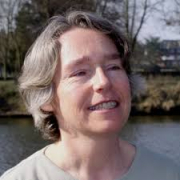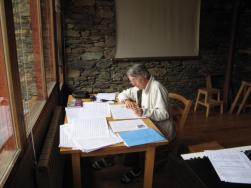Five Questions to composer, Nicola LeFanu.
What first attracted you to the idea of the Tokaido Road project?
 Lots of things! The opportunity of working with Okeanos again, and the chance to discover writing for koto and sho. The poems – I loved them, and their relationship with the woodblock prints. I already knew Hiroshige’s work, so it was great to embark on a project that would showcase it. The chance to write a music theatre piece, which combined visual and aural elements equally. Whereas in opera, everything is structured through the singing voice, in music theatre it is a case of weaving together diverse strands. But in both opera and music theatre, it is the overall pacing that is crucial.
Lots of things! The opportunity of working with Okeanos again, and the chance to discover writing for koto and sho. The poems – I loved them, and their relationship with the woodblock prints. I already knew Hiroshige’s work, so it was great to embark on a project that would showcase it. The chance to write a music theatre piece, which combined visual and aural elements equally. Whereas in opera, everything is structured through the singing voice, in music theatre it is a case of weaving together diverse strands. But in both opera and music theatre, it is the overall pacing that is crucial.
Tell us about your involvement in Tokaido Road.
As the composer, my job is to write the music! But it is a great deal more than that. Shaping the libretto and working with the librettist is at the heart of it. It was quite a long time before I discovered the dramatic focus that I wanted. When I realised that using that terrifying picture of the skulls and skeletons (The Vision of Kiyomori) was the key, things began to fall into place. In other words, Hiroshige was not only discovering the power of landscape painting, but he could bring home to people the truth of famine and persecution that existed because of the military government.
I love the fact that I am working in a team. Composing is solitary, but making theatre meant I could work with Nancy, with Caroline and Dominic. And the key person behind the whole project is Kate Romano. Nothing would have happened without her imagination and tenacity.
What excites you about contemporary arts?
That there us so much going on. It is a bit like the sixties, so much creativity and energy in so many fields. But it is harder than the sixties, as there is so much more bureaucracy now. We just got on and made things happen, without having to jump through so many hoops.
It is funny that people still tend to be derogatory about the sixties. I don’t think they understand what a heady time it was. In music, there were wonderful performers developing new repertoire, and so many opportunities for us who were beginning our professional careers.
What has the project taught you / shown you / made you aware of?
As this is my eighth work of opera or music theatre, I suppose it has reminded me of how addictive I find it!
More seriously, it was fun to explore spoken text alongside sung text. I can’t bear spoken text in opera because it falsifies the whole nature of the medium. But in music theatre it works fine. And I loved exploring the koto in relation to the spoken text, it is such a resonant and expressive instrument.
What relevance, for you, does the project have to today’s cultural environment?
I think I answered that already!
 The RPS Elgar Bursary provides financial support for mature composers, to allow for the creation of a new work which “may push back musical boundaries, but not at the expense of accessibility and integrity: in short, a work of which Edward Elgar himself might have approved.”
The RPS Elgar Bursary provides financial support for mature composers, to allow for the creation of a new work which “may push back musical boundaries, but not at the expense of accessibility and integrity: in short, a work of which Edward Elgar himself might have approved.” Congratulations to Nicola! Find out more on the RPS website here: Tokaido Road premieres at the Cheltenham Festival on Sunday 6 July, about which more can be found here.
Congratulations to Nicola! Find out more on the RPS website here: Tokaido Road premieres at the Cheltenham Festival on Sunday 6 July, about which more can be found here.
 Lots of things! The opportunity of working with Okeanos again, and the chance to discover writing for koto and sho. The poems – I loved them, and their relationship with the woodblock prints. I already knew Hiroshige’s work, so it was great to embark on a project that would showcase it. The chance to write a music theatre piece, which combined visual and aural elements equally. Whereas in opera, everything is structured through the singing voice, in music theatre it is a case of weaving together diverse strands. But in both opera and music theatre, it is the overall pacing that is crucial.
Lots of things! The opportunity of working with Okeanos again, and the chance to discover writing for koto and sho. The poems – I loved them, and their relationship with the woodblock prints. I already knew Hiroshige’s work, so it was great to embark on a project that would showcase it. The chance to write a music theatre piece, which combined visual and aural elements equally. Whereas in opera, everything is structured through the singing voice, in music theatre it is a case of weaving together diverse strands. But in both opera and music theatre, it is the overall pacing that is crucial.

 As part of this global celebration, here at Tokaido Road we are delighted to be championing an innovative, cross-disciplinary creative project that is predominantly female-led.
As part of this global celebration, here at Tokaido Road we are delighted to be championing an innovative, cross-disciplinary creative project that is predominantly female-led.








